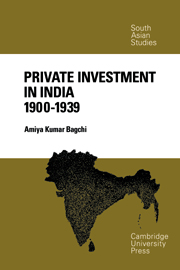Book contents
- Frontmatter
- Contents
- List of tables
- Preface
- Abbreviations
- PART I GENERAL – THEORETICAL FRAMEWORK
- PART II STUDIES OF MAJOR INDUSTRIES
- 7 The development of the cotton-mill industry
- 8 Private investment in the jute industry
- 9 The growth of the iron and steel industry
- 10 The growth of private engineering firms
- 11 The cement industry
- 12 The growth of the sugar industry
- 13 The development of the Indian paper industry
- 14 British imperial policy and the spread of modern industry in India
- Bibliography
- Index
14 - British imperial policy and the spread of modern industry in India
from PART II - STUDIES OF MAJOR INDUSTRIES
Published online by Cambridge University Press: 06 January 2010
- Frontmatter
- Contents
- List of tables
- Preface
- Abbreviations
- PART I GENERAL – THEORETICAL FRAMEWORK
- PART II STUDIES OF MAJOR INDUSTRIES
- 7 The development of the cotton-mill industry
- 8 Private investment in the jute industry
- 9 The growth of the iron and steel industry
- 10 The growth of private engineering firms
- 11 The cement industry
- 12 The growth of the sugar industry
- 13 The development of the Indian paper industry
- 14 British imperial policy and the spread of modern industry in India
- Bibliography
- Index
Summary
PRIORITIES OF THE IMPERIAL ORDER
India was the richest prize of the era of colonialism and the British held on to her well beyond the age of imperialism, in which Britain ceased effectively to be the leader of world capitalism. India occupied a special position in the British imperial order, and much of Britain's long-term policy with regard to India in the period covered in this book can be explained in terms of an effort to keep her in such a position. Up to 1914, India formed the biggest single foreign market for traditional British exports – particularly for cotton textiles, but to a lesser extent for engineering goods; India's exports to hard currency areas provided the critical balancing item in the current balance of payments of the British Empire and more particularly, of Britain, with the rest of the world; the payments for ‘home charges’, the profits on capital accumulated in India by British nationals and the payments for the financing and transport of Indian exports and imports served as the mechanism for the transfer of the surplus from India to Britain. India was useful less as a field for the reinvestment of profits made by British nationals elsewhere than as the dependable source from which part of the needed surplus for maintaining the British-controlled gold standard and the political apparatus of Pax Britannica was derived.
- Type
- Chapter
- Information
- Private Investment in India 1900–1939 , pp. 420 - 444Publisher: Cambridge University PressPrint publication year: 1972



